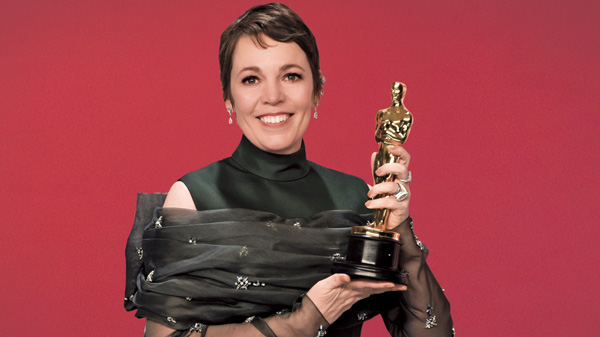Envisage the archetypal Hollywood leading lady. What springs to mind? Young? Beautiful? Willowy? The kind of sex appeal that would arouse an addled octogenarian from miles away? Yes. All of the above. What probably doesn’t spring to mind, however, is Olivia Colman.

Yet, this 45-year-old Brit actress is the toast of Tinseltown as the winner of this year’s Best Actress Oscar for her portrayal of Queen Anne, the 18th century British monarch in The Favourite. For many, this was Hollywood belatedly recognising that, almost imperceptibly, the last 20 years had seen 45-year-old Colman emerge as one of the acting profession’s all-time greats.
Her relatively low profile can, in part at least, be attributed to the fact that she refined her skills not in US films but, rather, in the more rarified surroundings of UK TV. She first came to the attention of the British public playing Sophie, a neurotic ex-girlfriend-to-be in Peep Show, a cult comedy that eventually ran for nine series. Then, she conquered a series of major roles – a small-town policewoman in the smash-hit crime series Broadchurch, the evil godmother in the cult comedy Fleabag and an alien-possessed parent in Doctor Who, to name but three.

From 2010 onwards, however, her career went through something of a sea change. Out were the goofy comedy roles and in came the meaty dramatic parts – an abused wife in 2011’s harrowing Tyrannosaur (2011) and Margaret Thatcher’s daughter Carol in The Iron Lady (2012), with Meryl Streep playing the title role. It was, however, just two years ago that Colman truly joined the big league and become internationally unmissable. That was the year she signed up for the role of the older Queen Elizabeth II in Netflix’s internationally-adored real-life royal soap The Crown.
Reflecting on her feelings when she knew she would be replacing Claire Foy, the 34-year-old English actress who had played the young Elizabeth to huge acclaim, Olivia Colman said: “I was such an enormous, binge-watching fan of The Crown. So, when the call came to join the cast, I was very uncool – ‘Yes, please, straight away, immediately’ – and didn’t really consider the inevitable pressure I was letting myself in for by signing up for something that was already so successful.”

Part of that pressure proved to be playing a woman famed for her absolute composure and reluctance to show emotions – traits that Colman sees as almost the complete opposite to her own character. Speaking after filming got underway, she said: “I emote. The Queen is not meant to. She’s got to be a rock for everyone and has been trained not to show her feelings. For me, though, when in character, if I received some bad news, I wanted to cry. In the end, I had to wear an earpiece and try and screen out my natural emotional response by listening to the Shipping Forecast whenever things got too intense.”
While playing the current Queen of England obliged her to remain uncharacteristically buttoned up, playing Queen Anne – her two-and-half-centuries-previous predecessor – in the film that took her to Academy Award glory, allowed her to give far freer rein to her emotions. In her bid to bring to life an eccentric, half-forgotten, grief-prone 18th-century monarch – one who sacrifices her regal role to win the love of certain of her most favoured subjects – Olivia Colman was obliged to shed any inhibitions and any notions of matriarchal insouciance. This freed her to deliver a true tour de force performance, one that is unlikely to be forgotten any time soon – not least because, as well as the Oscar, it also won Colman Best Actress at both the BAFTAs and the Golden Globes.

Unlike the majority of her fans – many of whom have long been convinced of her uninimitable greatness – Colman, herself, seemed somewhat taken aback by the very sweep of her success. Indeed, her Academy Awards acceptance speech was pretty much a masterclass in taking onboard unexpected adoration: “It’s genuinely quite stressful. This is hilarious. I got an Oscar…”
Her stock-in-trade self-deprecating humour aside, Olivia Colman still found space in her acceptance speech to try and inspire any watching actresses-in-waiting, saying: “Thank you. And to any little girl who’s practicing her own future acceptance speech back home, well you never know.”
Text: Suchetana Mukhopadhyay
Images: AFP



